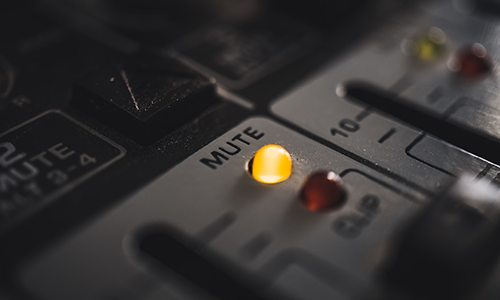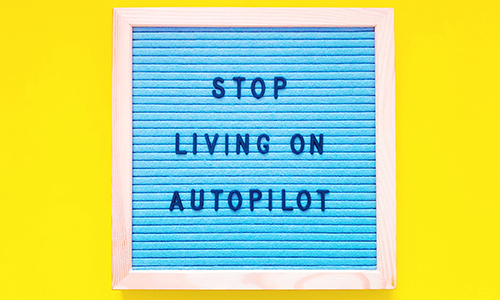The fact that we are able to reflect on things from the past and plan for the future makes thinking, feeling and acting complex. Maybe we just forgot how to be in the present moment and how to experience it fully? You surely recognize thoughts like:
- “I really have to … !”
- “If only I had done… yesterday.”
- “I mustn’t forget to…”
- “How long will it take until I finally …”
- Perhaps such thoughts are more familiar than thoughts like:
- “I can feel that I am tensing up right now.”
- “My mind is wandering and I‘m thinking about the next meeting, even though I’m talking to a customer.”
- “I’m not concentrating and should take a break.”
Most of the time, we’re not aware of those quiet but persistent thoughts and feelings. We tend to suppress or push them aside. Do you realize what is happening here? We suppress our needs! It’s like trying to mute the microphone for our needs. But they cannot just be switched off by doing this. Those thoughts and feelings still pop up because they fulfill an important function. If they remain unfulfilled, at some point they will come up more forcefully and scream out loudly. This is the moment when you can no longer perform properly and your mental health especially suffers a great deal.

MINDFULNESS AS THE KEY TO INNER BALANCE
Mindfulness
- enables you to feel and accept “what is”
- helps to focus and prioritise one’s own needs
- is the key to inner balance when stress, insecurity and tension shape your everyday life
- Is emotional intelligence (empathy towards yourself)

Mindfulness
= Conscious perception (awareness) of the current moment and an awareness of sensory impressions, thoughts and feelings – with an attitude of curiosity
Being mindful is like holding a flashlight in a dark room. Before everything was dark, we couldn’t see anything, suddenly we can see in the light: a table and a chair for example. We can also develop this conscious perception for our thoughts, body sensations and feelings. Or as mindfulness teacher Jon Kabat-Zinn puts it: “The past is over, the future has not yet happened. The present moment, the now, is the only moment in which we really live. ” Mindfulness is therefore an important skill and prerequisite for being able to take care of one‘s mental health in a self-sufficient manner. Experiencing the current moment consciously enables you to distance yourself from your emotions and thoughts, and thereby allows your perspective to change.
HOW TO HAVE MORE MINDFULNESS
In order to be mindful, it is important to selectively interrupt the autopilot (automatic reaction based on patterns and assumptions). Take the place of a conscious observer instead of being on autopilot.
Drifting away is part of it. It is important to recognize this and to redirect your awareness back to the present moment.
There are two ways to practice this:

1. Mindfulness through meditation
With guided mindfulness meditations (e.g. body scan, breathing) you train yourself to consciously redirect your focus Side effects when performing regularly:
- Better self-awareness
- Improved stress management and resilience
- More concentration and awareness
- More relaxation
- More empathy
- Strengthening the immune system
Do you feel like trying a mindfulness exercise? You don’t need a lot of time We have a short version for you, a mindfulness exercise: BODY SCAN
2. Mindfulness in daily life
Mindfulness can be integrated into any activity, any everyday situation. Have you ever tried taking a mindful shower?
If you are looking for more ideas about mindful everyday life, click HERE.



